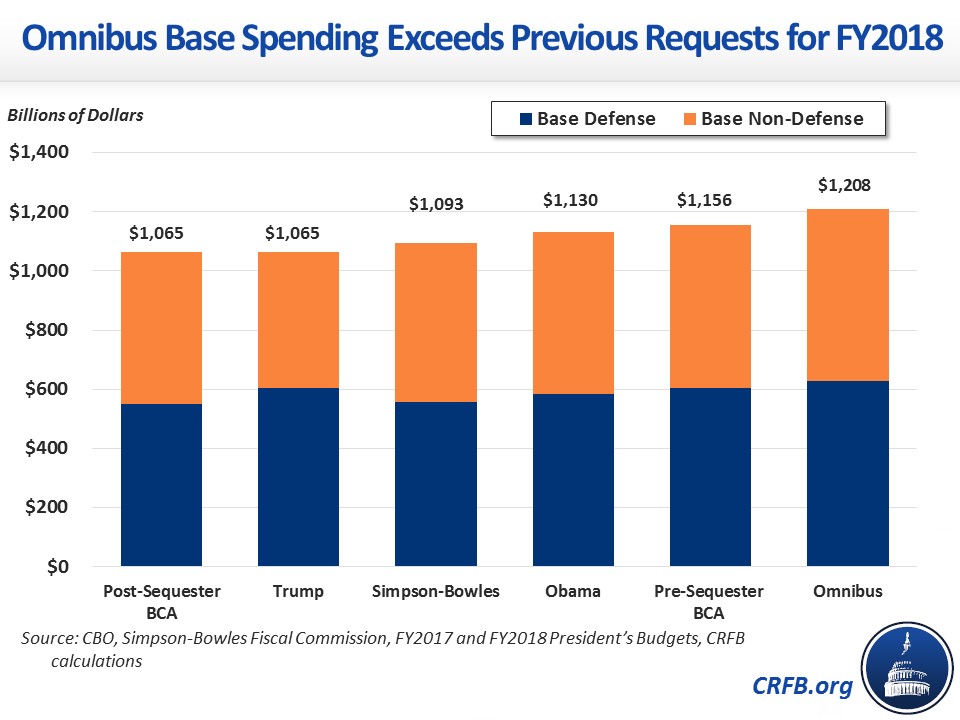The Omnibus Spent More than Either Side Asked For
The Bipartisan Budget Act of 2018 (BBA) increased this year's discretionary spending caps by a whopping $143 billion, paving the way for a 13 percent spending boost in the recent omnibus bill.
Some argue this spending increase simply reversed "sequester" spending cuts that neither side wanted. In reality, the BBA spent well in excess of that – busting the original bipartisan Budget Control Act (BCA) caps set in 2011 and spending well above any major proposal. In fact, the $1.21 trillion spent this year is over $50 billion above the original BCA caps, almost $80 billion above President Obama's final budget request, $115 billion above the recommendations of the bipartisan Simpson-Bowles commission, and more than $143 billion above President Trump's request.

These large cap increases appear to be the result of a bidding war in which each side gave the other more than what it asked for. The budget deal and omnibus increased base defense spending by $80 billion, which is $26 billion (almost 50 percent) more than the increase President Trump requested. The non-defense spending increase meanwhile was $63 billion, which is $33 billion more than (over double) the increase President Obama's final budget called for in 2018. Both defense and non-defense spending is even further in excess of the Simpson-Bowles recommendations.
| Amount By Which Omnibus Spending Exceeds Previous Requests (billions) | |||||
|---|---|---|---|---|---|
| Post-Sequester BCA Caps | Simpson-Bowles | Obama Budget | Trump Budget | Pre-Sequester BCA Caps | |
| Base Defense | +$80 | +$73 | +$45 | +$26 | +$26 |
| Base Non-Defense | +$63 | +$42 | +$33 | +$117 | +$26 |
| Total Base Spending | +$143 | +$115 | +$78 | +$143 | +$52 |
| OCO/Other Spending | n/a | +$30 | +$72 | +$1 | n/a |
Other spending includes disaster relief and certain program integrity, which are not limited by spending caps. Emergency funding is not shown, which totals an additional $126 billion in 2018. Obama cap reduction is net of an increase $6 billion larger than shown, but a decrease from reclassifying some spending currently under the caps as mandatory. Source: CBO, Simpson-Bowles Fiscal Commission, FY 2017 and FY 2018 Presidents' budgets, CRFB calculations
Put simply, the BBA and omnibus increased discretionary spending by more than either side asked for. And because it wasn't paid for, the BBA increased the deficit by $320 billion and set the stage for a $1.7 trillion increase if the bill is extended without offsets.
With trillion-dollar deficits expected next year, lawmakers cannot continue to add to the debt in the name of bipartisanship. Instead, policymakers should extend current law discretionary spending caps – scheduled to expire after 2021 – at levels that are both responsible and achievable. The case for maintaining current levels – well in excess of what either side asked for – is relatively weak. Reasonable increases relative to sequester-level spending should be fully offset with mandatory spending cuts, new revenue, or some combination
Update 4/14: Clarified phrasing and corrected a percentage. The non-defense increase is more than double Obama's proposed increase, rather than 70 percent higher.


